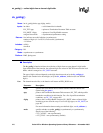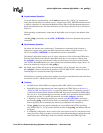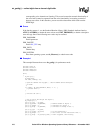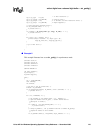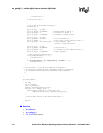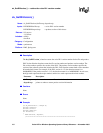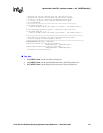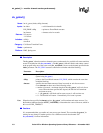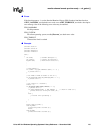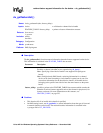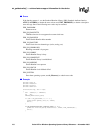
234 Voice API for Windows Operating Systems Library Reference — November 2003
dx_getevt( ) — monitor channel events synchronously
dx_getevt( )
monitor channel events synchronously
!
!!
! Description
The dx_getevt( ) function monitors channel events synchronously for possible call status transition
events in conjunction with dx_setevtmsk( ). The dx_getevt( ) function blocks and returns control
to the program after one of the events set by dx_setevtmsk( ) occurs on the channel specified in the
chdev parameter. The DX_EBLK structure contains the event that ended the blocking.
Note: When the time specified in timeout expires, dx_getevt( ) will terminate and return an error. Use
the Standard Attribute function ATDV_LASTERR( ) to determine the cause of the error, which in
this case is EDX_TIMEOUT.
!
!!
! Cautions
It is recommended that you enable only one process per channel. The event that dx_getevt( ) is
waiting for may change if another process sets a different event for that channel. See
dx_setevtmsk( ) for more information.
Name: int dx_getevt(chdev, eblkp, timeout)
Inputs: int chdev
• valid channel device handle
DX_EBLK *eblkp
• pointer to Event Block structure
int timeout
• timeout value in seconds
Returns: 0 if success
-1 if failure
Includes: srllib.h
dxxxlib.h
Category: Call Status Transition Event
Mode: synchronous
Platform: DM3, Springware
Parameter Description
chdev specifies the valid channel device handle obtained when the channel was
opened using dx_open( )
eblkp points to the Event Block structure DX_EBLK, which contains the event that
ended the blocking
timeout specifies the maximum amount of time in seconds to wait for an event to
occur. timeout can have one of the following values:
• number of seconds – maximum length of time dx_getevt( ) will wait for an
event. When the time specified has elapsed, the function will terminate
and return an error.
• -1 – dx_getevt( ) will block until an event occurs; it will not time out.
• 0 – The function will return -1 immediately if no event is present.



